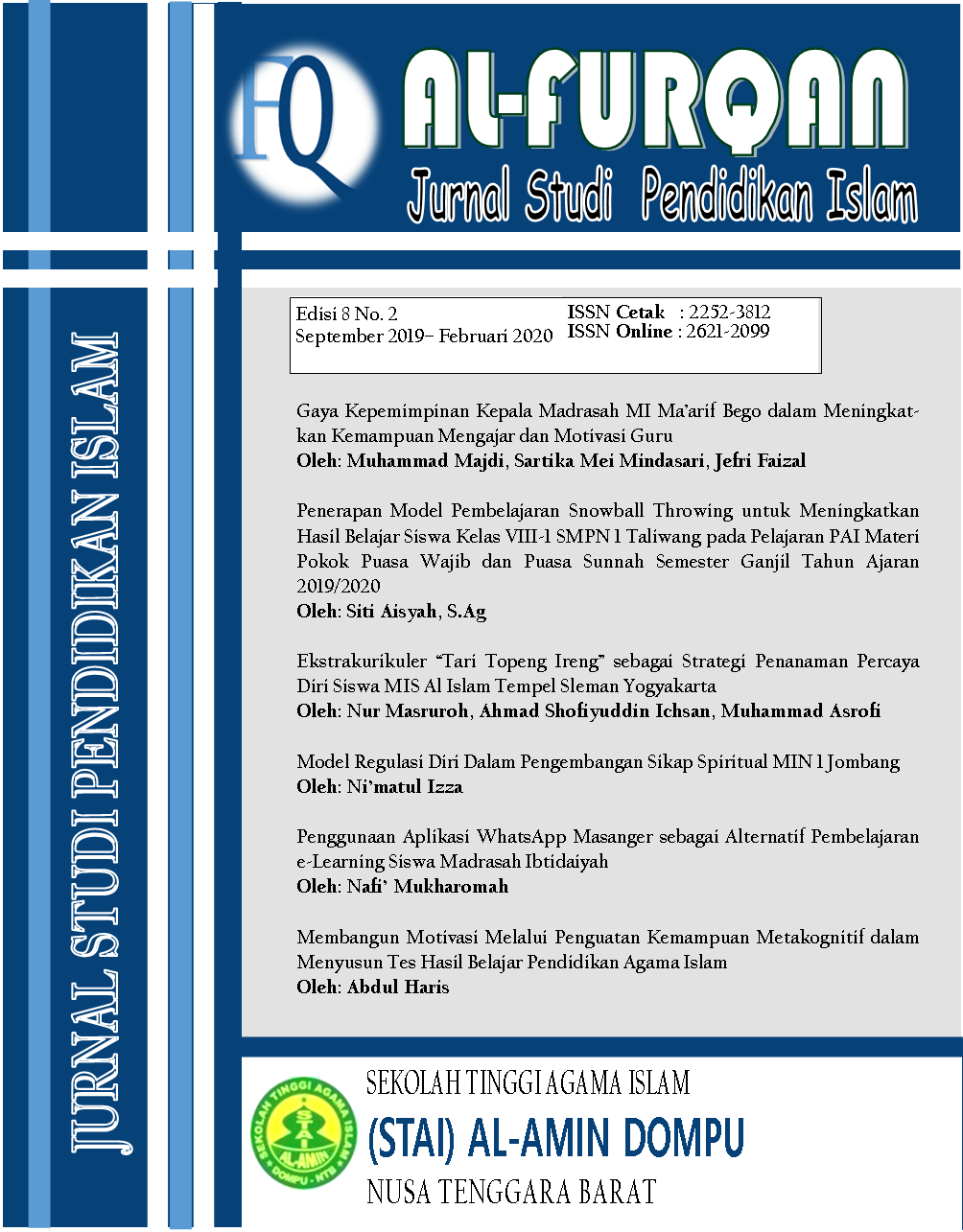Self Regulation Model in the Development of Spiritual Attitudes MIN 1 Jombang
Keywords:
Self-regulation, Self Regulatory Model, Spiritual attitude
Abstract
Spiritual attitude development as a conscious effort designed to assist individuals in developing knowledge, skills, and personality in spiritual attitudes. Four values ​​in the implementation are applied in primary schools that must be developed, namely, observance of worship, gratitude behavior, praying before and after doing activities, tolerance in worship. Based on this value there is a human relationship with God, humans with humans, and humans with the universe. In a relationship with God, human beings are obliged to perform compulsory worship, even though maintaining their terminology, everyone is not necessarily capable. Good self-regulation by regulating itself affects the process of spiritual attitude done in life. This study aims to describe the development of spiritual attitudes in MIN 1 Jombang. As well as describing the regulation model of MIN 1 Jombang students in carrying out compulsory worship. The research method used in this research is descriptive qualitative which intends to understand the main phenomena in developing spiritual attitudes in MIN 1 Jombang and describing the regulatory models of MIN 1 Jombang students. The findings that can be explained are, the self-regulation model of students in MIN 1 Jombang in maintaining the term of worship to perform compulsory worship tends to be from the external regulation model, the model that is influenced by others to run it, and the existence of these influences which then encourages students to carry out each when and continuously and become a habit, so that without being instructed by others students will do it themselves, the model of self-regulation changes into an intrinsically motivated behavior model in which he feels that worship is a very valuable activity that needs to be done.References
A. Bandura, 1986. Social Foundations Of Thought And Action: A Sosial Cognitive Theory. New jwesey: Prentice- hall
Agusnawar, 2002. Psikologi Pelayanan. Bandung: alfabeta
Agus Sofyandi Kahfi. 2013. Religiousness Islami dan Self Regulation Para Pengguna Narkoba, dalam jurnal Mimbar: Vol.29, No.1
Bruner Jerome, 1960. The Process Of Education. Cambridge, Massachusetts: Harvard University Press
Brown dan Ryan dalam Lisya Chairani dan M.A Subandi. 2010.Psikologi Santri Penghafal Al- Quran Peranan Regulasi Diri. Yogyakarta: Pustaka Pelajar
E.Mulyasa, 2013. Guru dalam implementasi kurikulum. Bandung: Remaja Rosdakarya
Desmita, 2009. Psikologi Perkembangan Peserta Didik. Remaja Rosdakarya: Bandung
Ghufron & Risnawita. 2011. Teori-teori Psikologi. Jogjakarta: Ar-Ruzz Media
Inge Hutagalung, 2015. Teori-teori Komunikasi dalam Pengaruh Psikologi. Jakarta: Indeks
Jeanne Ellis Ormrod, 2009. Psikologi Pendidikan Membantu Siswa Tumbuh dan Berkembang, Berkembang, Jilid 2, terj. Amitya Kumara. Jakarta:Erlangga
Lisya Chairani dan M.A Subandi.2010 Psikologi Santri Penghafal Al-Quran Peranan Regulasi Diri Yogyakarta: Pustaka pelajar
Kementerian Agama, 2008. Al-Quran dan Terjemahannya Jakarta: Jumunatul Ali Art
Mansur. 2005. Pendidikan Anak Usia Dini Dalam Islam. Yogyakarta: Pustaka Pelajar
Mar’at,1981. Sikap Manusia Perubahan Serta Pengukurannya.Bandung: Ghalia Indonesia.
Muhaimin dalam Asmaun sahlan. 2010. Mewujudkan Budaya Religius di Sekolah. Malang: UIN- Maliki Press
Muhyani. 2012. Pengaruh Pengasuhan Orang Tua dan Peran Guru Di Sekolah Menurut Persepsi Murid Terhadap Kesadaran Religius dan Kesehatan Mental. Jakarta: Kementerian Agama Republik Indonesia
Restu Kartiko Widi, 2010 Asas Metodologi Penelitian. Yogyakarta: Graha Ilmu.
Sarliti. W. Sarwono & Eko A. Meinarno, 2015, Psikologi Soaial. Jakarta: Salemba Humanika
Agusnawar, 2002. Psikologi Pelayanan. Bandung: alfabeta
Agus Sofyandi Kahfi. 2013. Religiousness Islami dan Self Regulation Para Pengguna Narkoba, dalam jurnal Mimbar: Vol.29, No.1
Bruner Jerome, 1960. The Process Of Education. Cambridge, Massachusetts: Harvard University Press
Brown dan Ryan dalam Lisya Chairani dan M.A Subandi. 2010.Psikologi Santri Penghafal Al- Quran Peranan Regulasi Diri. Yogyakarta: Pustaka Pelajar
E.Mulyasa, 2013. Guru dalam implementasi kurikulum. Bandung: Remaja Rosdakarya
Desmita, 2009. Psikologi Perkembangan Peserta Didik. Remaja Rosdakarya: Bandung
Ghufron & Risnawita. 2011. Teori-teori Psikologi. Jogjakarta: Ar-Ruzz Media
Inge Hutagalung, 2015. Teori-teori Komunikasi dalam Pengaruh Psikologi. Jakarta: Indeks
Jeanne Ellis Ormrod, 2009. Psikologi Pendidikan Membantu Siswa Tumbuh dan Berkembang, Berkembang, Jilid 2, terj. Amitya Kumara. Jakarta:Erlangga
Lisya Chairani dan M.A Subandi.2010 Psikologi Santri Penghafal Al-Quran Peranan Regulasi Diri Yogyakarta: Pustaka pelajar
Kementerian Agama, 2008. Al-Quran dan Terjemahannya Jakarta: Jumunatul Ali Art
Mansur. 2005. Pendidikan Anak Usia Dini Dalam Islam. Yogyakarta: Pustaka Pelajar
Mar’at,1981. Sikap Manusia Perubahan Serta Pengukurannya.Bandung: Ghalia Indonesia.
Muhaimin dalam Asmaun sahlan. 2010. Mewujudkan Budaya Religius di Sekolah. Malang: UIN- Maliki Press
Muhyani. 2012. Pengaruh Pengasuhan Orang Tua dan Peran Guru Di Sekolah Menurut Persepsi Murid Terhadap Kesadaran Religius dan Kesehatan Mental. Jakarta: Kementerian Agama Republik Indonesia
Restu Kartiko Widi, 2010 Asas Metodologi Penelitian. Yogyakarta: Graha Ilmu.
Sarliti. W. Sarwono & Eko A. Meinarno, 2015, Psikologi Soaial. Jakarta: Salemba Humanika
Published
2020-02-29
How to Cite
IZZA, NIMATUL-. Self Regulation Model in the Development of Spiritual Attitudes MIN 1 Jombang. AL-FURQAN, v. 8, n. 2, p. 31-42, 29 Feb. 2020.
Section
Articles
Copyright (c) 2020 AL-FURQAN

This work is licensed under a Creative Commons Attribution-NonCommercial-NoDerivatives 4.0 International License.






